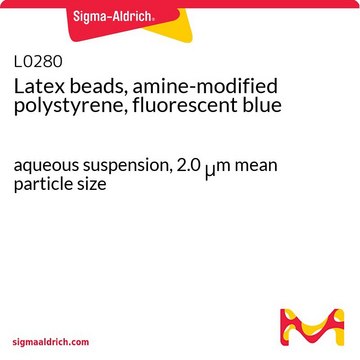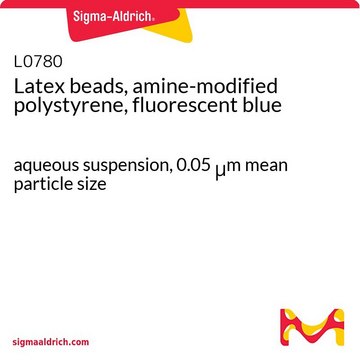LB6
Latex beads, polystyrene
0.6 μm mean particle size
Sign Into View Organizational & Contract Pricing
All Photos(1)
About This Item
Recommended Products
form
aqueous suspension
composition
Solids, 10%
mean particle size
0.6 μm
Looking for similar products? Visit Product Comparison Guide
General description
Polystyrene microparticles are anionic-stabilizedcolloidal particles. These microparticles are synthesized by the polymerizationof styrene under conditions that produce coalescent bead formation. Polystyrenelatex beads have a wide range of applications including phagocytosis experiments,antibody-mediated agglutination diagnostics, electron microscopy, and cellcounter calibration.
Storage Class Code
12 - Non Combustible Liquids
WGK
WGK 3
Flash Point(F)
Not applicable
Flash Point(C)
Not applicable
Choose from one of the most recent versions:
Already Own This Product?
Find documentation for the products that you have recently purchased in the Document Library.
Customers Also Viewed
Joanna Koziel et al.
PloS one, 4(4), e5210-e5210 (2009-04-22)
It is becoming increasingly apparent that Staphylococcus aureus are able to survive engulfment by macrophages, and that the intracellular environment of these host cells, which is essential to innate host defenses against invading microorganisms, may in fact provide a refuge
Je-Wen Liou et al.
PloS one, 6(5), e19982-e19982 (2011-05-19)
Recent research shows that visible-light responsive photocatalysts have potential usage in antimicrobial applications. However, the dynamic changes in the damage to photocatalyzed bacteria remain unclear. Facilitated by atomic force microscopy, this study analyzes the visible-light driven photocatalyst-mediated damage of Escherichia
Our team of scientists has experience in all areas of research including Life Science, Material Science, Chemical Synthesis, Chromatography, Analytical and many others.
Contact Technical Service





